We are out of here. In the next 24 hours, we will take a "sleeper bus", a taxi, a wide-body jetliner, a 400 km/h Maglev train, and a subway to get from here:
...to here:
...then, about 60 hours later, we start our journey home.
So I guess it is time to wrap up our impressions of Vietnam. Seeing as it is the calendar-flipping time of year and everyone else is doing it, I can do is list-style. So here are the best and worst things about Vietnam:
Best: Food.
Beyond the pho (which on its own was pretty damn good most of the time), we had numerous street-food encounters that were outstanding. Banh khoai, bun bo Hue, banh xeo, banh mi, or basically anything wrapped in rice paper and dipped in savoury sauce. We had hits and misses with restaurant food, and the coffee was either really good or really terrible, but the street food encounters were almost always exceptional. As was the abundance of fresh fruit (we ate a lot of pineapple, dragon fruit, and lychees), seafood, and crusty, chewy, freshly baked baguettes.
Worst: Motorcycles.
At first they were kind of cool, an obvious approach to rapid urban growth with little infrastructure to support it. More motorcycles fit on the road than cars, use less gas, and people need to get places, right? After three weeks, it is obvious they are a bane on the livability of the community. I noted in a small fishing village of a few thousand people that we were the only people walking down the street. Everyone else was on a motorcycle, some doubled up, some carrying cargo. It is like everyone forgot how to walk a few blocks. In the bigger centers, every sidewalk and every open space is full of motorcycles. You need to run the gauntlet of them to get to a storefront. Huge numbers of them are in poor repair, and many are very smoky, but all of their horns work. Constantly.
It makes you wonder what the society was like 20 years ago when people were mostly using bicycles, or what it would have been like if, 20 years ago, the Country had the money to build any kind of public transit system. As it is now, the local bus service is notoriously unreliable because it is mired in motorcycle traffic. The ground-level air quality in the big cities is atrocious, and the use of (ridiculously ineffective) dust masks is ubiquitous.
A tour guide on one trip told us that your motorcycle sets your fate as a young man in Vietnam. Nice motorcycle means nice girlfriend, old broken down motorcycle means old broken down girlfriend, no motorcycle means no girlfriend. Two motorcycles, two girlfriends. No doubt a bit of a joke for the tourists, but telling of the deep societal hold the motorcycle has on a country with more than 70 million of them on the road (a number, notably, larger then the number of adults living in Vietnam).
Best: Ease.
Vietnam is a remarkably safe and easy country in which to travel. Aside from crossing the street in a big city (which you kind of get the rhythm of by watching the old ladies), we were never troubled by how to get to where we were going, or ever felt unsafe, even at night in some grubbier parts of the big towns. We travelled by boat, local bus, regional bus, turboprop, train, taxi, bicycle, and foot, and always got where we intended with little drama, and sometimes even on time. The closest we ever felt to being harassed was in the retail environment.
Worst: Sales.
This was especially bothersome for Tig; we generally couldn't walk past a retail store, a restaurant, a bar, a taxi or a person on a motorcycle without someone shouting greetings, honking a come-on, or asking us where we were from, or if we might be interested in an "easy rider" tour - only one hour! Going for a 10 minute walk inany touristy area could become tiresome after being berated every 15 seconds with some retail offer. Even when we did go into a shop, the clerk followed you about, three feet off your arm, asking you questions, showing you a knick-knack that was essential to your enjoyment of life, is only 10,000 dong, but that you somehow walked right past without expressing an interest in. The hard sell was always on, and there was no sense of personal limits.
It almost became a rule of thumb for restaurants that the more aggressively inviting the waving street-shouter out front was, the more casually indifferent the serving staff inside was. Attempting to order a second drink or (god forbid) getting the bill could take ten or fifteen minutes as the staff seemed to have forgotten there was already someone inside the restaurant. Even the street food vendors who work so hard to entice you to try their version of the same thing the other stalls are offering commonly dump the food on the stool in front of you with indifference bordering on surliness once the order is made. I just couldn't square this particular circle. Maybe it was us.
Best: Service.
In contrast to above, we stayed at some fabulous Guest Houses and Inns, and had almost universally excellent service - above and beyond in most cases. From giving us hot tea and a warm towel on arrival to helping us arrange tours or just directions to a nice restaurant or around town for sights. They took an effort to learn our names (often comically in the case of Mrs. Antigone), and greet us by name on our return each day. Even the place we paid $18 a night! Friendly without being too intrusive, and seemingly always in good cheer,the people who ran the guest houses were just nice peope being nice! It made "coming home" after a day of exploring a strange foreign culture, strange streets, and general bustle of traveling much more pleasant, and it seemed more genuine than the street hustle, as there was never a sale involved.
Worst: Trash.
Like some other "developing" economies we have visited (Belize comes to mind) there is a patina of plastic film rubbish on everything. Every view, no matter how idyllic, has garbage in view. This is clearly a cultural, not economic, phenomenon, as we have visited other "developing" countries where this is not so prevalent. Unfortunately, plastic film and other litter is everywhere, and people from cops to bus drivers to fishermen just toss their plastic to the side and walk away. It is a shame to see such a beautiful landscape spoiled.
Best: Landscape.
From powder-white beaches and sand dunes in Mui Ne, to colonial buildings and urban greenspace in Hue to paddy fields and mountain streams through cloud-forests and a thousand secluded bays on karst islands, everywhere you look in Vietnam there is a beautiful scene unfolding. I wish my photography skills were up to the task of some of the spectacular examples.
Finally, both best and worst: Youthfulness.
This takes a bit of explaining.
Despite the millennia-plus history of the region, Vietnam is a young country. After spending the last couple of centuries fighting off colonizers from adjacent lands and the opposite side of the Earth, the modern Vietnam did not find peace and start defining itself until after the collapse of the Soviet Union. The population is also young. Despite a recent drop to a more sustainable birth rate (enforced by a government "two child only" policy), the post-conflict baby boom and sudden immigration to swelling urban areas gives at least the impression of a very young average age.
This gives the entire nation a youthful sense of energy. It is always moving, always on the go. The zooming motorcycles, the cell phones, the ubiquitous wifi in neighbourhoods with barely functioning sewers. Walking down shoulder-width alleys in Hanoi, we could see into the tiny, dark, cramped (often filthy) living quarters of some of the new urbanites, and they all had flat-screen TVs on. Motorcycles, if not ridden by young adults, were often ridden by young families (sometimes 4 on one - adults with helmets, of course). The evening street corners are packed with young workers drinking Bia Hoi, texting, laughing and listening to tunes. There are countless LED-saturated Karaoke bars and dance clubs. It looks fun to be young and Vietnamese in 2014.
But youth isn't all fun and hijinks. With youth comes the experiments, blustering confidence masking self-doubts, and the potential failures that bring adulthood and wisdom. I sense these in Vietnam - maybe the inevitable self-contradictions of a society trying to find itself in the hormone rush of capitalist adolescence. The Apple Computer logo is omnipresent, next to the revolutionary banners with Hammer & Sickle. Although up to 70% of the population are farmers, it is hard to imagine the youth we see with their smartphones and Nikes and Yamahas slopping around knee-deep in the rice paddies when their parents retire in the coming decades. The youth are leading by raising their Samsungs, not the Kalashnikovs the leaders of the last generation are displaying in patriotic posters that still line the country - even if they look a little faded by the sun.
The tentative steps into western-style retail providing soetimes strange examples (a store in Mui Ne sold bus tours, shirts, pizza and tattoos); The shitting-in-your-own-nest attitude that results in a garbage-strewn countryside and temple grounds and exhaust-filled skies blighting the beauty of the place; The aggressive development adjacent to barely-finished buildings that are already falling apart; Cement trucks pumping at midnight on Christmas Eve in the centre of a tourist area; so many times we wondered - what the hell are they thinking?!
I'm aware this sounds very holier-than-thou. A rich tourist passing what sounds like judgments on people whose experience I can hardly begin to understand during my three week vacation. Just another economic exploiter (my MEC travel backpack says "made in Vietnam" in the little label inside) interjecting his colonial ideals where they probably aren't welcome. But that's not my intention. It's just me voicing my curiosity about where this young, energetic, exciting country is going to go when the acne clears up and it decides what it wants to be.
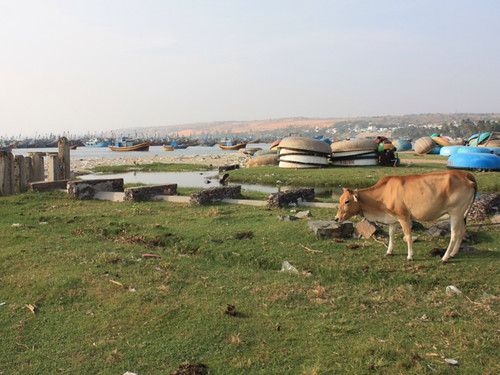
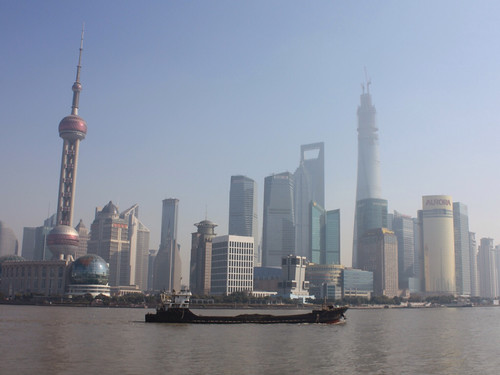
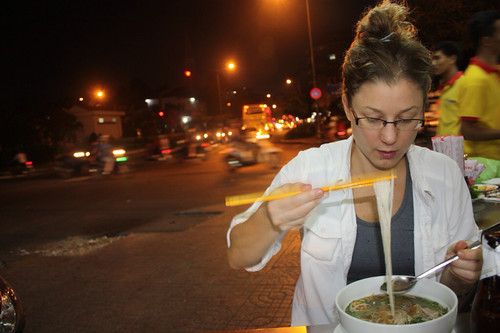
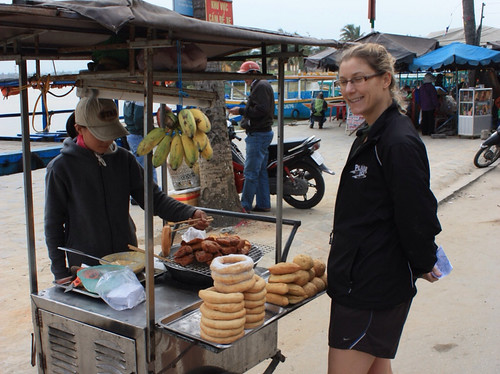
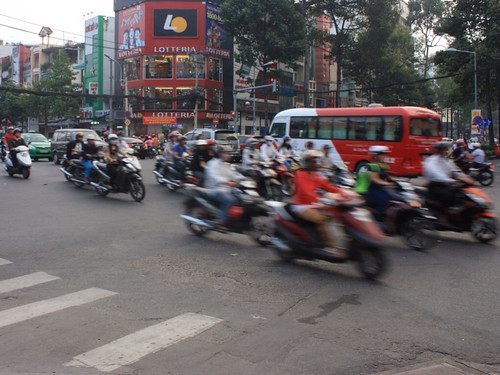
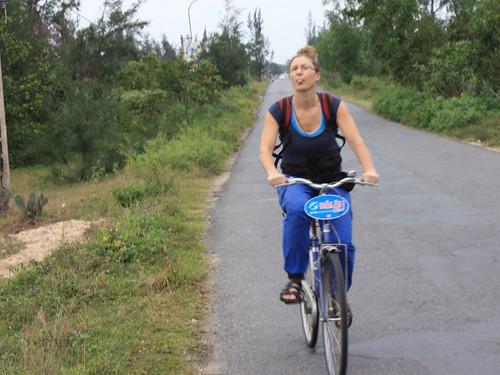
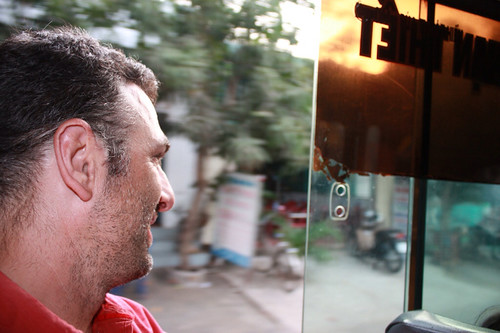
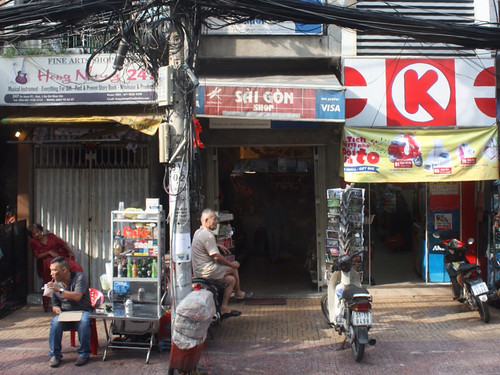
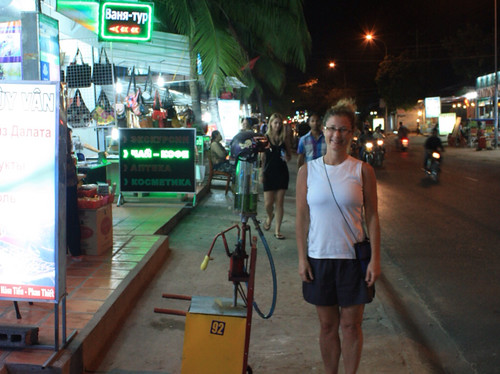
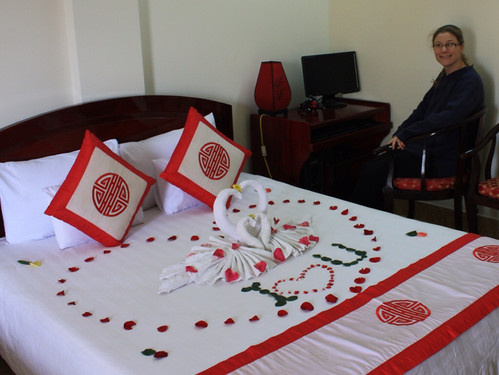
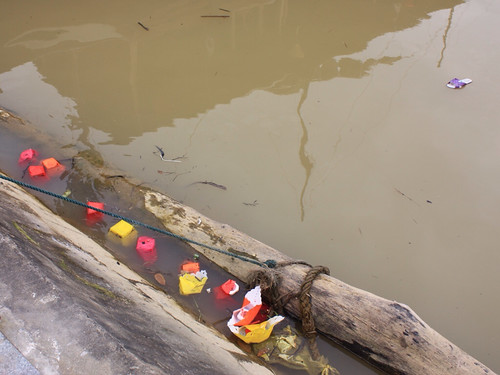
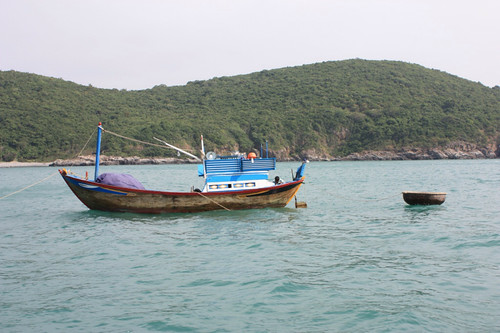
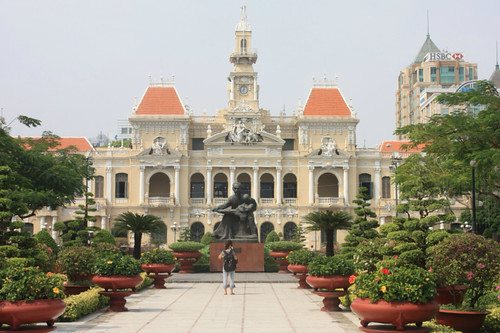
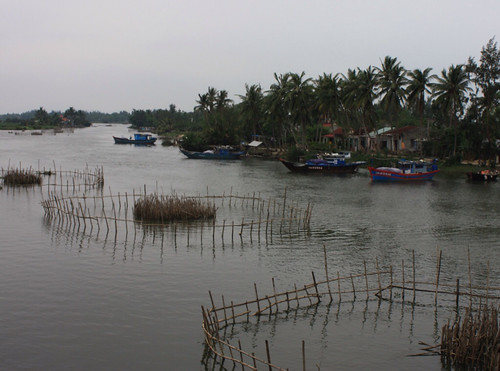
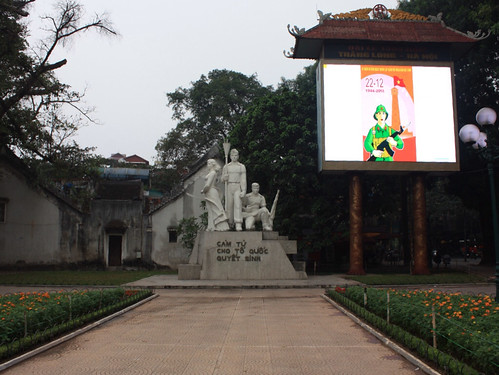
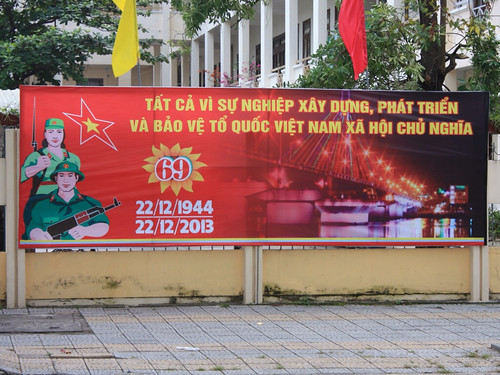
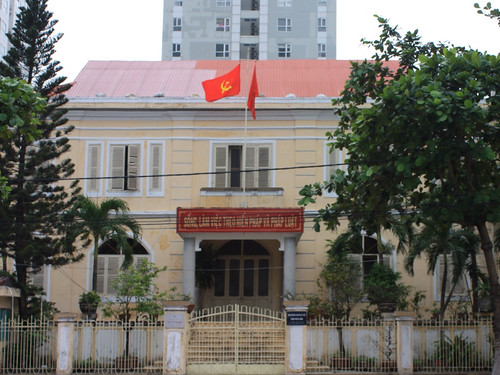
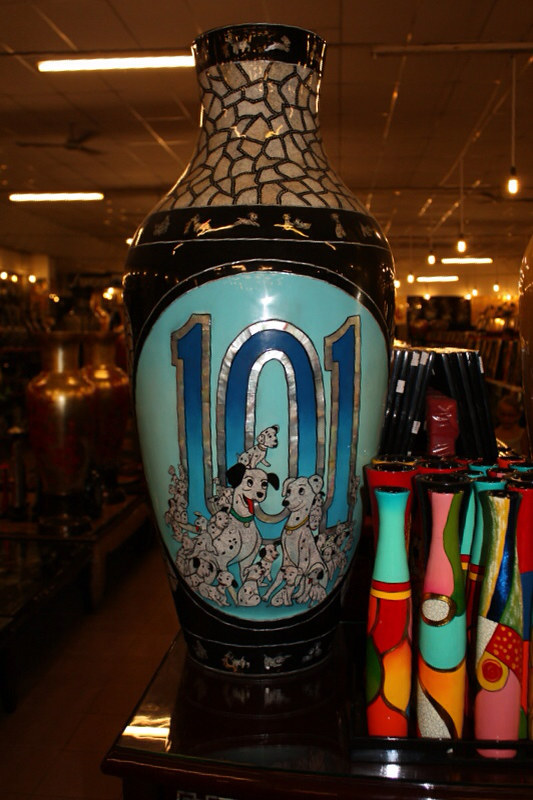
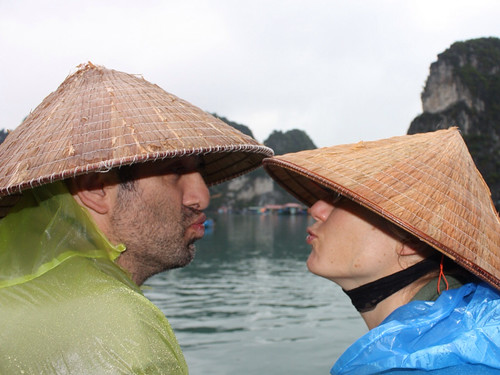
No comments:
Post a Comment